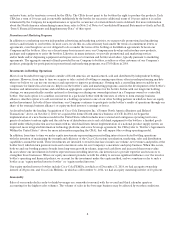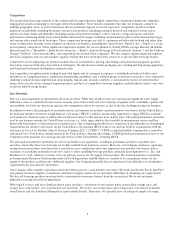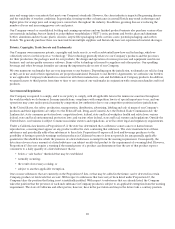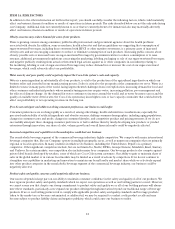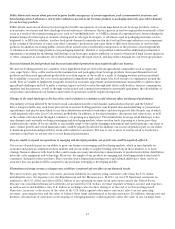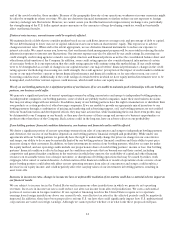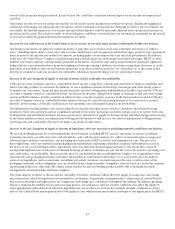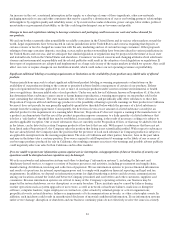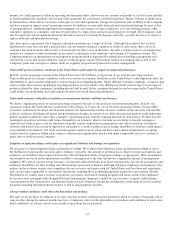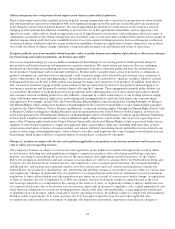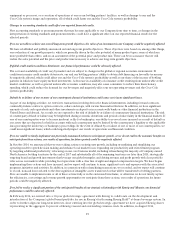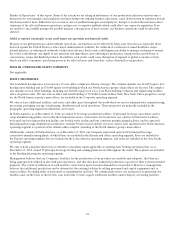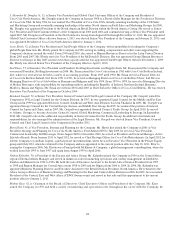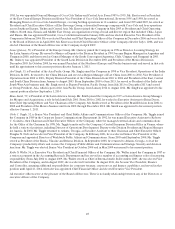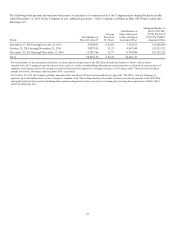Coca Cola 2014 Annual Report Download - page 20
Download and view the complete annual report
Please find page 20 of the 2014 Coca Cola annual report below. You can navigate through the pages in the report by either clicking on the pages listed below, or by using the keyword search tool below to find specific information within the annual report.18
Climate change may have a long-term adverse impact on our business and results of operations.
There is increasing concern that a gradual increase in global average temperatures due to increased concentration of carbon dioxide
and other greenhouse gases in the atmosphere will cause significant changes in weather patterns around the globe and an increase
in the frequency and severity of natural disasters. Decreased agricultural productivity in certain regions of the world as a result of
changing weather patterns may limit the availability or increase the cost of key agricultural commodities, such as sugarcane, corn,
sugar beets, citrus, coffee and tea, which are important sources of ingredients for our products, and could impact the food security of
communities around the world. Climate change may also exacerbate water scarcity and cause a further deterioration of water quality in
affected regions, which could limit water availability for the Coca-Cola system’s bottling operations. Increased frequency or duration
of extreme weather conditions could also impair production capabilities, disrupt our supply chain or impact demand for our products.
As a result, the effects of climate change could have a long-term adverse impact on our business and results of operations.
If negative publicity, even if unwarranted, related to product safety or quality, human and workplace rights, obesity or other issues damages
our brand image and corporate reputation, our business may suffer.
Our success depends in large part on our ability to maintain the brand image of our existing products, build up brand image for
new products and brand extensions and maintain our corporate reputation. We cannot assure you, however, that our continuing
investment in advertising and marketing and our strong commitment to product safety and quality will have the desired impact
on our products’ brand image and on consumer preferences. Product safety or quality issues, actual or perceived, or allegations of
product contamination, even when false or unfounded, could tarnish the image of the affected brands and may cause consumers to
choose other products. In some emerging markets, the production and sale of counterfeit or “spurious” products, which we and our
bottling partners may not be able to fully combat, may damage the image and reputation of our products. In addition, from time to
time, we and our executives engage in public policy endeavors that are either directly related to our products and packaging or to
our business operations and the general economic climate affecting the Company. These engagements in public policy debates can
occasionally be the subject of backlash from advocacy groups that have a differing point of view and could result in adverse media
and consumer reaction, including product boycotts. Likewise, campaigns by activists connecting us, or our bottling system or supply
chain, with human and workplace rights issues in developing and emerging markets could adversely impact our corporate image
and reputation. For example, in June 2011, the United Nations Human Rights Council endorsed the Guiding Principles on Business
and Human Rights, which outlines how businesses should implement the corporate responsibility to respect human rights principles
included in the United Nations “Protect, Respect and Remedy” framework on human rights. Through our Human Rights Policy, Code
of Business Conduct and Supplier Guiding Principles, and our participation in the United Nations Global Compact, as well as our
active participation in the Global Business Initiative on Human Rights and the Global Business Coalition Against Human Trafficking,
we have made a number of commitments to respect all human rights. Allegations, even if untrue, that we are not respecting one or
more of the 30 human rights found in the United Nations Universal Declaration of Human Rights; actual or perceived failure by our
suppliers or other business partners to comply with applicable labor and workplace rights laws, including child labor laws, or their
actual or perceived abuse or misuse of migrant workers; and adverse publicity surrounding obesity and health concerns related to our
products, water usage, environmental impact, labor relations or the like could negatively affect our Company’s overall reputation and
brand image, which in turn could have a negative impact on our products’ acceptance by consumers.
Changes in, or failure to comply with, the laws and regulations applicable to our products or our business operations could increase our
costs or reduce our net operating revenues.
Our Company’s business is subject to various laws and regulations in the numerous countries throughout the world in which
we do business, including laws and regulations relating to competition, product safety, advertising and labeling, container
deposits, recycling or stewardship, the protection of the environment, and employment and labor practices. In the United
States, the production, distribution and sale of many of our products are subject to, among others, the Federal Food, Drug, and
Cosmetic Act, the Federal Trade Commission Act, the Lanham Act, state consumer protection laws, the Occupational Safety
and Health Act, and various environmental statutes, as well as various state and local statutes and regulations. Outside the
United States, the production, distribution, sale, advertising and labeling of many of our products are also subject to various laws
and regulations. Changes in applicable laws or regulations or evolving interpretations thereof, including increased government
regulations to limit carbon dioxide and other greenhouse gas emissions as a result of concern over climate change, or regulations
to limit or eliminate the use of bisphenol A, or BPA (an odorless, tasteless food-grade chemical commonly used in the food
and beverage industries as a component in the coating of the interior of cans), or regulations to limit or impose additional costs
on commercial water use due to local water scarcity concerns, may result in increased compliance costs, capital expenditures and
other financial obligations for us and our bottling partners, which could affect our profitability, or may impede the production
or distribution of our products, which could affect our net operating revenues. In addition, failure to comply with environmental,
health or safety requirements, U.S. trade sanctions, the U.S. Foreign Corrupt Practices Act and other applicable laws
or regulations could result in the assessment of damages, the imposition of penalties, suspension of production, changes to


